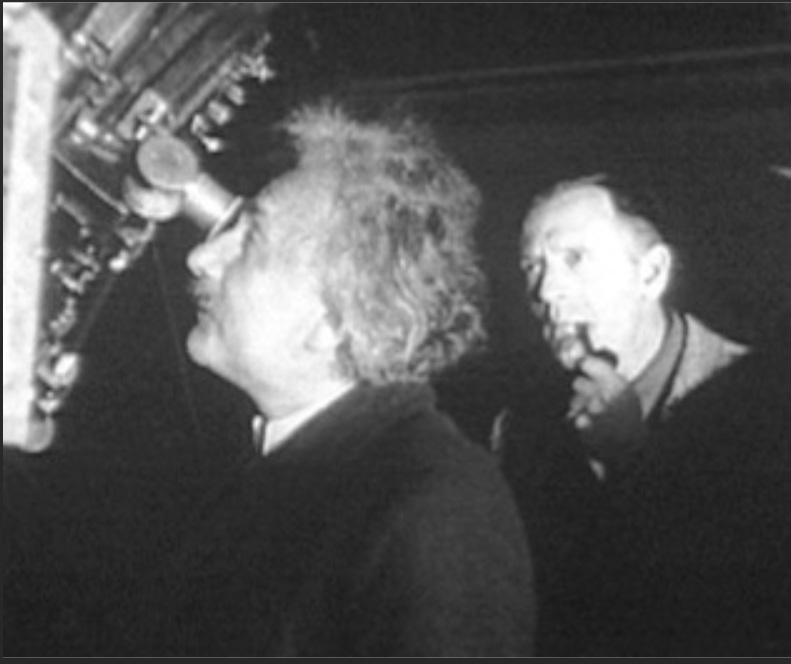The Enlightenment and the Shifting View of Creation
In the castle of the Enlightenment, the door between faith and science had stood open since the middle ages. Philosophers oiled the rusted hinges of the massive portal, led by Scottish Philosopher David Hume, who argued in 1779 that creation had no need of a creator. Hume’s contemporary, Immanuel Kant, similarly proposed the idea of an eternal, self-existent universe, giving further momentum to the shift away from a creator-centric understanding – no creator needed thanks! Together, their groundbreaking ideas pushed against the old door and began closing it despite the groans and squeals from its ancient hinges.

The Big Bang and the Expanding Universe
Charles Darwin kicked the door shut with his magnum opus On the Origin of the Species written 70 years later in 1859. Not only was the transcendent not necessary for the creation of the universe, it was redundant for the evolution of living things. Natural selection and time was all that was required – and an infinitely old universe provided plenty of time. Atheists Sigmund Freud and Karl Marx slid the deadbolt home and in 1882 Neitzche hung the sign on the door that read “God is Dead”.
Cosmologists like Einstein sat back relieved that the hulking door was finally shut – even if a little light came in the bottom. Einstein got to work on his 1917 paper the Theory of Relativity in which he assumed a static universe – so confident was he that he “fudged” his cosmological constant to make his equations balance in a static universe. While the door remained firmly shut, that light seeping in from below was getting brighter – and strangely it had a red hue.
Edwin Hubble (of the Hubble Space Telescope) peered through the most powerful telescope of his day, the 100 inch telescope on top of Mount Wilson, puzzling over the distinct red hue of light emitted from distant galaxies when he realized that the red hue was explained by the fact that galaxies Hubble was viewing were in fact moving away from us! Hubble’s genius was in realizing that distant galaxies were moving away from us faster than nearer galaxies – in other words the universe was expanding. More importantly, was the reflection that followed: if the universe was expanding, at some distant point in the distant past the space between the galaxies must have been zero.

The Big Bang
Einstein’s Greatest Blunder
The Big Bang theory arrived on the cosmology scene as welcome as the 1918 Flu but far less infectious. While Einstein wasn’t happy about this development, his colleague, British astronomer Arthur Eddington despaired, “Philosophically, the notion of a beginning of the present order is repugnant to me…I should like to find a genuine loophole, I simply do not believe the present order of things started off with a bang. The expanding Universe is preposterous…It leaves me cold.”

Einstein and Hubble on Mount Wilson
In 1931 Einstein visited Hubble on Mount Wilson, and saw the light (the red light). He graciously concluded: “New observations by Hubble and Hamason concerning the red shift of light in distant nebulae”, establish that “the general structure of the universe is not static”. “The red shift of the distant nebulae has smashed my old construction like a hammer blow.” It also meant that his fudged “cosmological constant” was, as he put it, the “greatest blunder of my life”. What refreshing candour and humility from one of the geniuses of our time!

The Door is Reopened
The Parallels Between Science and Investing
Quite simply, the Big Bang theory kicked that old door open and brought the issue of origins of the universe back into doubt and once again allowed for the possibility of a creator in the creation story. No, Einstein and other scientists of the day weren’t happy about it – but they knew better than to ignore or deride the new developments – they were, after all, scientists and they recognized that science is never settled.
For me, Einstein’s story stands in stark contrast to the current “science is settled”, anti-scientific mantra we keep hearing from people who purport to be scientists. The irony of living in the information age is that we have politicized science and find ourselves in a world that prefers soundbites to true scientific debate. In a sense we choose faith over reason.
Recently, pollsters discovered that a majority of Americans no longer support the First Amendment and believe that the government should restrict “false information online”. To which any reasonable person should ask, “exactly who gets to determine what information is true”? source: https://www.pewresearch.org/short-reads/2023/07/20/most-americans-favor-restrictions-on-false-information-violent-content-online/
Embracing Optimism and Progress
‘Einstein’s Error’ underscores an enduring truth: both our understanding of the cosmos and the investment landscape is a constant journey, not a static snapshot. Certainty can blind us to novel insights, much like Einstein’s initial error and denial of an expanding universe.
Finance has its share of misplaced beliefs as well. Our ‘Einstein Errors’ could be the beliefs we see as unshakable today— the preeminence of passive investing, the safety of government bonds, or the dominance of value over growth investing. But like Einstein’s static universe, these beliefs may one day be upended.
So what is certain? What can investors believe in? For me, scientific progress, entrepreneurial ingenuity and human resilience are certainties. Seen through the lens of these traits, our current problems are tomorrow’s opportunities. This isn’t to minimize the problems we face, but it is a reminder that optimism is a rational belief to hold despite them.
Glen
ps: I encountered this fascinating history in ‘The Return of the God Hypothesis,’ a contentious new book by Stephen Meyer, an Oxford-trained philosopher of science and geophysicist. I highly recommend it – but only to open-minded readers!
